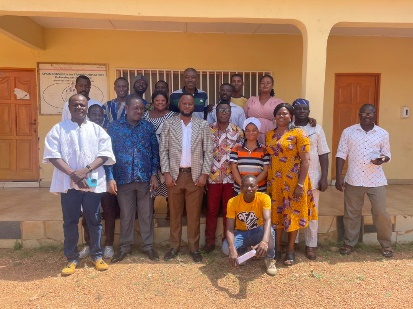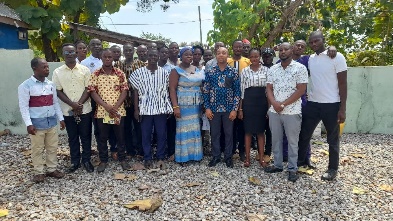Next Generation Leadership
The Next Generation Leadership Training (NGLT) is designed to build the capacity of Assembly Members in Ghana to enable them effectively undertake their roles and responsibilities envisaged in the local governance Act 2016 (Act 936). It is delivered as the second training programme after the “general orientation and training programme” for newly elected or appointed members of the DA.
In 1988, Ghana introduced a new form of state-local government relations or decentralization and local governance called the ‘District Assembly’ (DA) system. The new system enabled the citizens living in electoral areas to elect their representatives to the District Assembly. The elected representatives constituted two-thirds of the total membership of the DA while the central government appointed one-third. The new decentralization and local governance system failed to give powers to the people to directly elect the Chief Executives of the DAs. Central government politicians retained that power of appointment and not even a shift to Constitutional and multi-party democracy in 1992 could change that system of local governance.
The 1992 Constitution makes the district or the municipal assembly the highest political authority in the district with deliberative, legislative and executive powers [Article 240(3)]. The District Assemblies are the pillars around which local decision making and development revolve. They are responsible for:
- the overall development of local areas as well as playing a role in the formulation and preparation of the district development plan and budget
- effective mobilisation and utilization of human, physical and financial resources for economic and social development
- provision of basic infrastructure, municipal works and services
- development, improvement and management of human settlements, and the maintenance of security and public safety, and
levy and collection of taxes, rates, duties and fees.
Members of a District Assembly are made up of the Chief Executive that is appointed by the President, elected representatives of the citizens from each electoral area, the Member(s) of Parliament from the constituencies that fall within the area of authority of the District Assembly; and thirty per cent of the total membership of the District Assembly appointed by the President
The Assembly Members
As representatives of the citizens in an area, Assembly members are expected to perform their deliberative, legislative and executive functions optimally. In the performance of their deliberative roles, Assembly members are to raise development opportunities and challenges that exist in their electoral areas at the Assembly level for discussions and decision making. In terms of legislative functions, the assembly members are to make byelaws and organize themselves into committees to undertake executive functions of the Assembly. The executive functions of the DA are executed by staff of the DA that is made up employees appointed by the Office of the Local Government Service, other Central Government agencies and those employed by the DAs.
Specifically, the functions of the Assembly members as listed in the Local Governance Act, 2016 (Act 936) are to:
- maintain close contact with the electoral area of the District Assembly, consult the people of the electoral area on issues to be discussed in the District Assembly, collate their views, opinions, and proposals;
- present the views, opinions and proposals of the electorate to the District Assembly;
- attend meetings of the District Assembly and meetings of sub-committees of which that member of the District Assembly is a member;
- meet the electorate before each meeting of the District Assembly;
- report to the electorate the general decision of the District Assembly: and actions the member has taken to solve problems raised by residents in the electoral area;
- draw attention in general debate to national policies that are relevant to the subject under discussion;
- actively participate in the work of the sub-committees of the Executive Committee;
- maintain frequent liaison with organized productive economic groupings and other persons in the district; and take part in communal and development activities in the district.
Assembly members are expected to play leading roles in envisioning the development path of their local areas and the district as a whole. This includes support in the mobilization of resources, linkages of the community to the Assembly and assist in revenue collection; organize communal and voluntary work; educate the people on their rights, privileges, obligations, and responsibilities; and make proposals for transforming their electoral areas as well as oversee the work that staff and functionaries of the assembly undertake in their areas of authority.
With the exception of the Chief Executive whose remuneration is determined by Parliament and charged to the consolidated fund, the remuneration of the works performed by other members of the Assembly are determined by the District Assembly and paid through the Assembly’s own resources. Given this condition, the pecuniary incentives that Assembly Members have, to perform their functions are dependent on the resources that the Assembly is able to mobilise. In the cities because of the increasing number of people that the Assembly Members have to engage, the cosmopolitan nature of the citizens, the high and varied demand for services, the ‘voluntarily’ work of the Assembly members become more challenging. There is therefore a tendency for the functions of the Assembly Members as enumerated above to be undertaken without much enthusiasm.
Furthermore, it is expected that the functions of the Assembly members would be delivered with the requisite competencies. However, many Assembly members do not have the necessary functional skills, academic qualifications as well as technical know-how to enable them deliver their responsibilities. Providing the needed training to Assembly Members is a step in the right direction to improve the functions of DAs. Many training programmes do not target Assembly members, and in many DAs, apart from the initial orientation programme that the government organized for all assembly members, there has not been any follow up training that seeks to improve their competences.
The NGLT aims to equip assembly members with the requisite knowledge, skills and attitudes in 5 functional areas:
|
No. |
Functional Areas |
Legal Backing |
|
1 |
Representative Function |
|
|
2 |
Deliberative Function |
|
|
3 |
Legislative Function |
|
|
4 |
Executive Function |
|
|
5 |
Oversight/Accountability Functions |
|
The NGLT is designed on the assumption that the LG set-up provides the needed foundation for developing future national politicians with the requisite leadership skills in representative, deliberative, legislative, executive and accountable democratic governance. The set-up also provides opportunity for LG politicians to learn and practice good democratic principles for local and national development.
The course is designed and delivered in ways that enable local politicians to bring local development challenges and opportunities to the classroom for analyses and proffered solutions. Participants complete the course knowing they are ready to bring new changes in the way they have performed their five key roles and responsibilities.
Learning Objectives and Outcomes
By the end of the training Assembly members are able to:
- Appreciate the qualities of a Next Generation Leader.
- Appreciate the critical roles of the District Assemblies, the LG system and the functions of the Assembly members.
- Understand their executive, deliberative, legislative, representative and oversight functions.
- Analyse existing challenges and opportunities in their electoral areas and present them to the General Assembly for deliberations and resolutions.
- Organise meetings at the community level to report on the deliberations of the assembly and their implications to the electoral area.
- Debate or provide cogent arguments in support or against discussions at the Assembly, properly move motions and draw attention of members to proper meeting procedures.
- Perform executive committee duties assigned to them.
- Provide critical oversight (scrutinize the financial, budget, and audit report) of the Assembly and make insightful decisions to promote accountability
- Make byelaws that are needed to promote orderliness at the district
- Strengthen the working relationship between Assembly members and District Administration
Training Methods
The training begins with a video documentary that summarizes the challenges and opportunities in local governance in Ghana. Participants are given the chance to discuss the issues in the documentary and their implications on the role of AMs. Then the rest of the modules will follow sequentially.
Given that the intended target group is composed of adult-learners and practitioners, the programme will be flexible and experiential. It will adopt various learning methods to ensure participants are equipped with knowledge, skills and attitudes including the use of, power point presentation, practical case studies, interactive sessions, and team building exercises.
The training is organized in three days and will be non-residential. Participants are expected to commute from their homes to the designated training venues.
Training Evaluation
At the end of the programme, participants will respond to specially designed questionnaires to evaluate the programme. This will be supplemented with oral statements of their impressions of the programme. The purpose is to assess the feedback of participants and the learning achieved by them during the period. Impressions of various modules and any new knowledge, skills and attitudes acquired during the programme will be solicited. This will form part of the training report to be prepared by the Institute.
Mentorship and Follow-up
After the training programme, participants will be given mentors who will support and guide them in the local governance journey. They will be attached to local governance experts who will respond to their questions and challenges being encountered by Assembly members in the engagements with community members, traditional authorities and District Administrators and other stakeholders.
|
|
|
|




